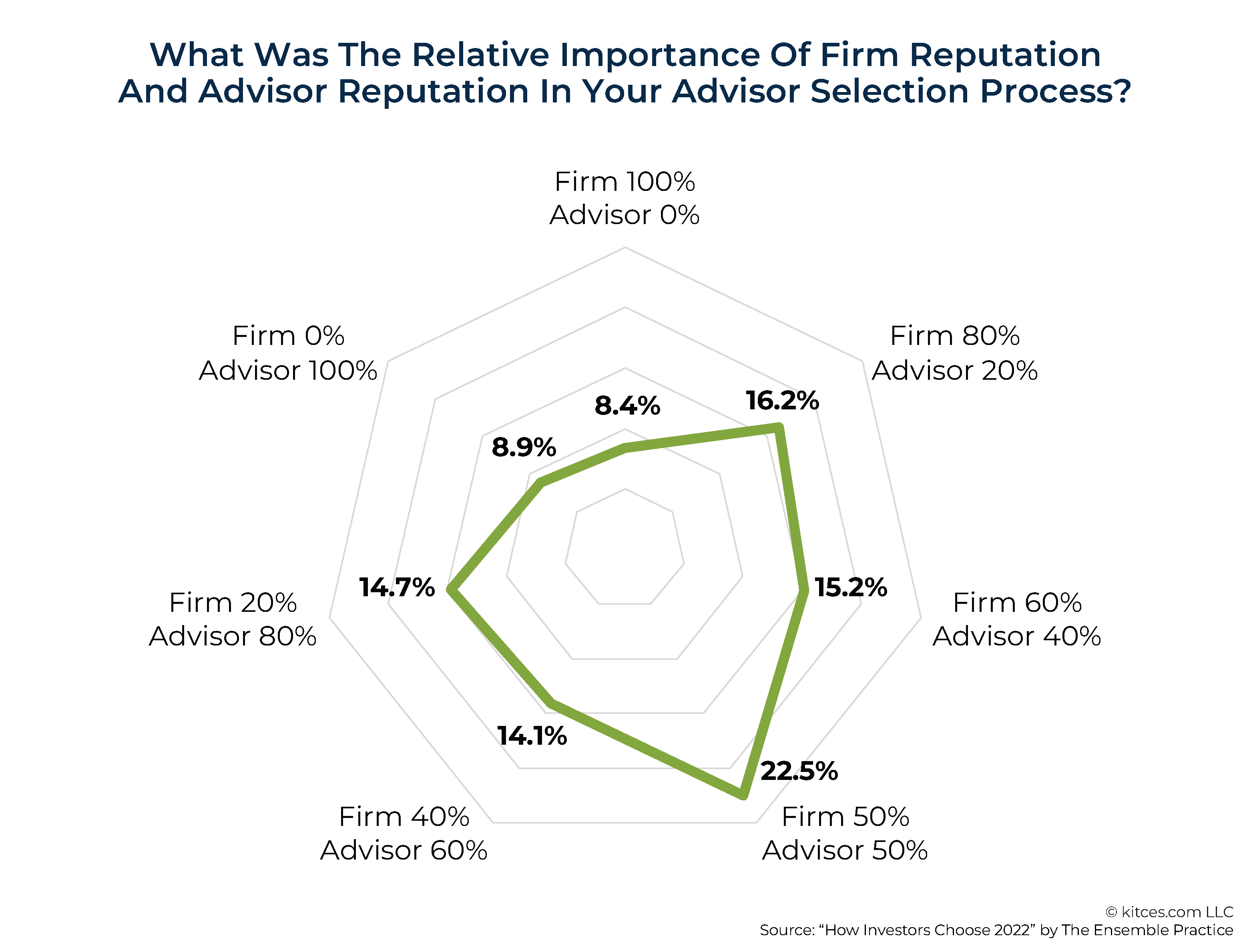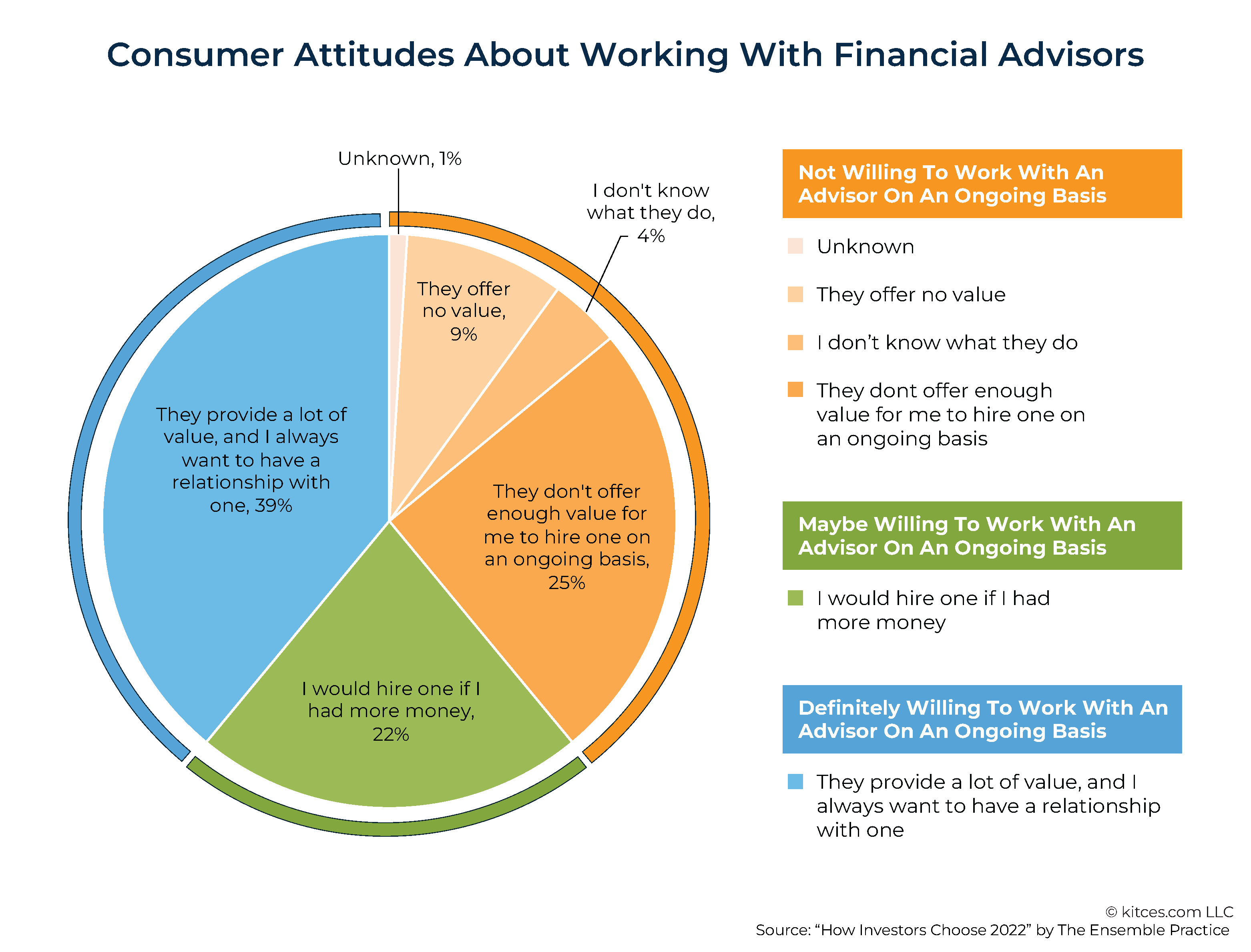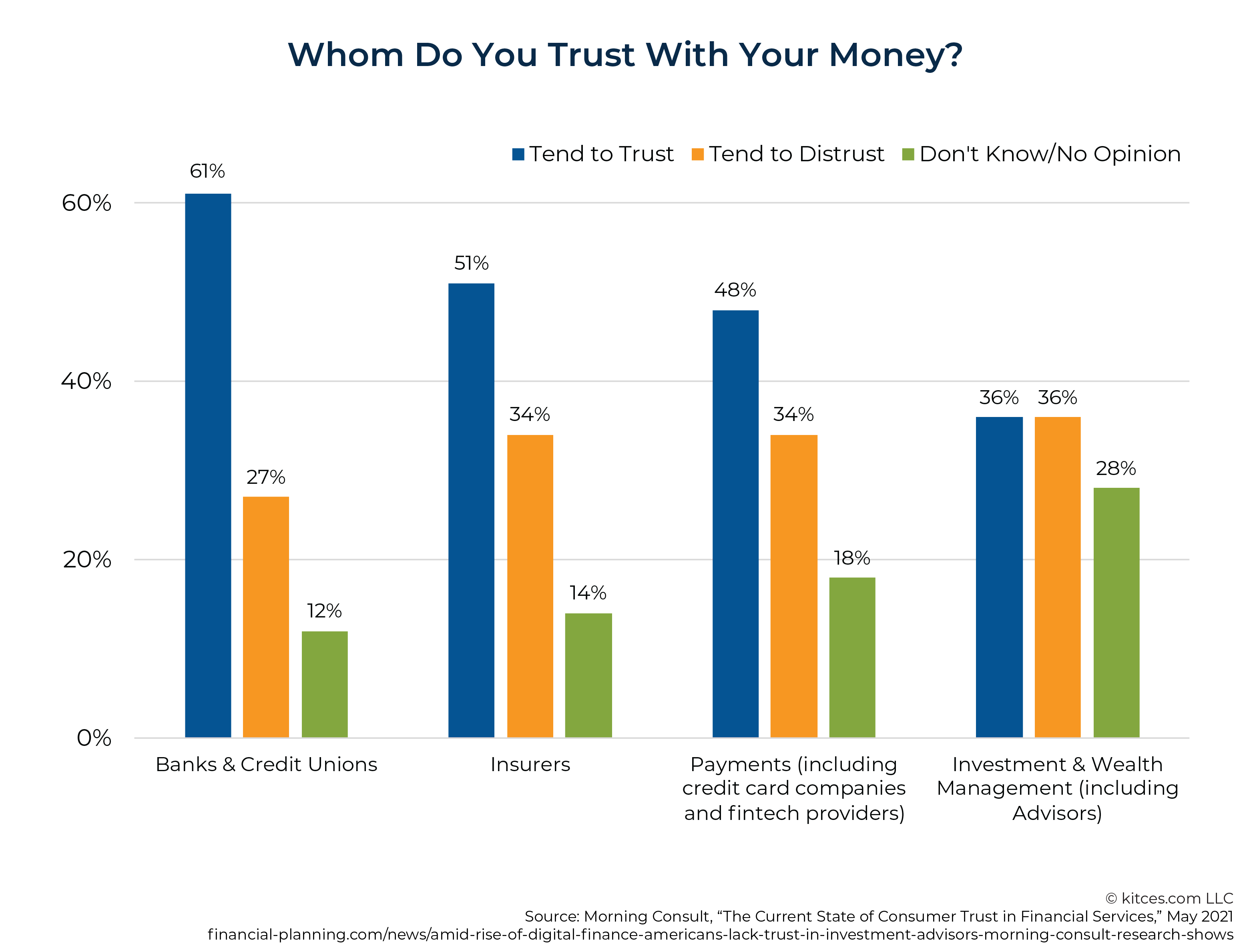Executive Summary
The requirements to run a successful, growing advisory firm are often less about doing the technical work with clients and more about marketing value to get prospects in the door in the first place. Yet, many firms' prospecting strategies have often relied on individual advisors being able to bring business to the firm instead of actively shaping and promoting the firm's own reputation. And as independent financial advisors have shifted away from transaction-based roles into more holistic, person-oriented, and advice-centric ones, many marketing campaigns have adopted a 'good guy' (e.g., comprehensive, planning-centric, fee-based advisors) versus 'bad guy' (e.g., ignorant, overcharging stockbrokers) storytelling approach to promoting the industry. More often than not, though, this type of storytelling only serves to reduce consumer trust in the industry more than building trust in a firm, making business development efforts harder for individual advisors and, ironically, driving more people away from engaging with an advisor at all.
When it comes to a firm's business development efforts, individual advisors benefit most from firms with a strong brand and reputation for offering stellar and relevant client service, otherwise, the advisors often become wholly responsible for marketing themselves to find clients for the firm. If our industry is likened to sports, we can consider firms like teams and advisors as players; in this way, it becomes clear that promoting the industry (sport) as a whole positively and in a constructive manner benefits not just the firm (team), but the individual advisors (players) as well!
Which means that advisors should not be expected to champion the planning industry alone when prospecting for clients. This is especially true for advisors early in their careers; just like rookie athletes, they need the support and resources of their firms. So it behooves firms to prioritize their reputation and client experience to attract clients, who get channeled to the best advisors, who become well-known for their excellent work… which, in turn, builds up the firm's reputation even higher.
While focusing on promoting the industry more positively may be a helpful (and much-needed) shift, individual advisors and firms can also work collectively to sell financial planning by promoting the value of their firms as a whole and not just by showcasing the talent of individual advisors. Incidentally, this strategy can also improve the firm's client retention in the long term, since clients are sold on the firm experience rather than on any one individual advisor. Furthermore, advocates of the industry such as the CFP Board and other professional organizations can also support both the health and growth of the industry by taking the initiative to positively promote it, which can encourage more individuals to seek out financial planning services (and therefore more 'winners' for the firms and their advisors!).
Ultimately, the key point is that, much as how ticket sales to a basketball game are likely influenced by the reputation of the player, the team, and the sport, prospecting for financial planning clients is influenced by the reputation of the advisor, the firm, and the industry as a whole. Rather than marketing with heroes and villains, promoting the overall industry (while still emphasizing the value that makes a particular firm unique) can help firms build robust brands and offer marketing structures to their advisors, empowering them with the ability to provide great, holistic advice to their clients and build trust in the industry themselves – 1 client at a time!
Independent advisory firms have been growing slower than ever and, similar to a modern glacier, some may even be involuntarily shrinking. Much like in the case of the environment, we may be willfully ignoring what is happening and not taking the necessary steps to change our behavior so that we can avoid a disaster. To grow faster, independent advisory firms have to go back to 2 very basic questions: How much advice do consumers really want, and what do they buy when they hire an advisor?
If you buy a ticket to see the Indiana Fever, you are making 3 decisions: 1) You are choosing an experience (WNBA basketball), 2) you are choosing to see a team (Fever), and 3) perhaps you want to see a player (Caitlin Clark). Very likely, it was the reverse order of importance – many are in the seats just for Caitlin Clark – she has that star power now. Some may be Fever fans – the team had fans before Clark. Some may even be there for the basketball without necessarily rooting for a team or a player. To be there though – you need to buy all 3.
The same is true when a client signs an advisory contract – they may be there for the advisor (the player), the firm (the team) or the advice itself (the sport). All 3 are a part of the buying decision, and the way in which these 3 components interact defines a lot of our advisory industry dynamics, economics, and perhaps its future.
If advisory firms want to continue growing, they ought to make a commitment to continue promoting the sport (giving valuable advice), growing the brand of their team (marketing the firm), and investing in their players (supporting individual business development). All 3 elements are necessary. Unfortunately, advisory organizations do almost nothing to elevate the status of advice and often actually undermine it. They only dabble in marketing and urge their younger professionals to become business developers mostly through osmosis – somehow absorbing the vague sales methods of the founders. The result is disappointing and perhaps alarming.
We Need Famous Teams To Support Rookie Players
Historically, the independence movement for financial advisors did not have famous teams (firms) but it always had players with their own fan base. That 'fan base' (client base) was often developed during a career with another team and provided a stream of referrals that fueled the initial growth of a newly found firm. Sometimes those 'fans' signed up initially for a 'different game' – they may have been accounting clients, insurance clients, or even the clients of a law firm. The point is, somehow, they were exposed to the expertise of the advisor, and they became a 'fan'.
Today, years after the firm was started, founders often forget that when they initially developed their clients, there was a second ingredient to their success – the firm they were with. Founders often over-attribute their personal success to their own efforts and believe that they individually brought the clients to the firm. The reality is that the clients often came first to the firm before the advisor earned their loyalty (or the firm squandered it). The fans went to see the Patriots and met Tom Brady, they followed Destiny's Child before they cried and danced with Beyoncé, they went to watch the Avengers before they learned about Doctor Strange.
I will be first to admit that – when I started my career, 'my' clients came to me because of Moss Adams – the firm I was with and not because of "Philip" (my personal reputation and expertise). The team at Moss Adams was a famous team, and that team propelled my personal reputation. It was the team 'selling tickets' and not me. Later, when I started my own firm, I already had a reputation from those years that I could rely on; I already had fans because Moss Adams had done a great job of promoting the team. Had I started on my own and without that boost I would likely still be where I am in my career as a poet – I have published 1 short poem.
I point that out not because I want to question the success of the founders (or my own) but rather because I am worried about the success of the next generation (G2). If they are going to become good business developers, they are going to need a 'famous jersey'.
Clients would be the first to insist that they prefer a famous player in a famous jersey. When we at The Ensemble Practice ask consumers how much relative importance they assign to the advisor and the firm they hire, we see a mix of responses. We surveyed 1,000 consumers with income over $100,000 in 2022, and only 8%–9% of consumers were comfortable with just the advisor or just the firm – the rest prefer a mix of the 2.
Unfortunately, modern independent advisory firms do very little to make the firm famous and expect younger advisors to become famous on their own – something that is very, very difficult for newer advisors to do. Independent firms spend between 1% and 2% of their annual revenues on marketing – that's not a lot. For many firms, it is less than they spend on office supplies like staples and Post-it notes. What is worse is that even when they decide to spend more money on marketing, advisory firms often struggle with what to say. Once I was involved in judging a marketing plan contest with a $50,000 prize that would have gone to fund the budget of the winning firm. We, the panel of judges, had trouble picking a winner because the participating firms had trouble spending the $50,000 – there were not a lot of good ideas beyond hosting another golf outing and wine tasting.
It's not that firms are cheap – many are buying growth through acquisitions and willing to pay much higher rates. Firms simply don't know what to say that will attract more clients. To a significant degree, that's because the firms have no idea who they are talking to. Most advisory firms have very hard time deciding who they want to have as a client.
If advisors want to inspire someone and spur them to action, it doesn't hurt to know who they are talking to. Still, most advisory firms adamantly refuse to specialize. They market to "families, executives, entrepreneurs, professors, performers, people going through major life transitions and non-profits". Marketing any kind of advice (business or personal) is a lot about knowing what keeps your prospective clients awake at night but it is very difficult to find the common denominator that keeps non-profits and professors awake. Imagine creating a dating profile intended to attract any person of any place, education, age, or set of hobbies. Most likely all that could be said is, "A good human known to create great relationships with good humans (but human is not a must)". Now let's outsource the creation and maintenance of the profile to a firm that also creates all the other profiles on the dating app. That's advisory marketing for you.
The result is a crop of independent firms that are virtually unknown, even if many firms are very successful and profitable. I have tried a game many times asking my personal friends and acquaintances to name an independent advisory firm in Seattle – no one can name any. Very often, even advisors in an independent firm are not very aware of their independent competitors. If I ever press my friends to name an advisory firm, they usually name Fidelity or Merrill Lynch.
Start With The Team By Growing Its Brand
If advice is a team sport, the team reputation has to be in the lead. This is because teams have more longevity, and the team fame combined with individual talent create the most compelling combination. Barcelona was famous before and after Maradona and Messi (and Stoichkov). The Lakers had a lot of fans before LeBron and will after. Team reputations have longevity while the individual careers fade away.
The reality is that advice simply isn't an individual sport. Mike Tysonsold a lot of tickets. So did Joe Frazier and Jack Dempsey before them but those names are gone from contemporary boxing and some are even forgotten. Individual reputations come and go with the fragility of individual lives and age. If we rely on individual reputations to 'sell tickets' like we have in the past, sooner or later we will be watching the 'exhibition matches' where an out-of-shape former champion tries to harvest the last few scraps of their reputation.
The problem is not that the founders who started the independent firm are tired – they should be, they have been doing this for too long – it is that we have been selling tickets to an individual show rather than a team one, and individual shows fade away even when they are amazing.
The logical sequence of decisions for the health of the financial advice industry is as follows: 1) The service of advice is highly regarded and sought by most consumers, and there are many firms with good reputations that attract those consumers; 2) the firms channel the consumers to their best advisors; and 3) these advisors, in turn, become well known for their excellent work. This, in turn, grows the reputation of the firms with the best players and elevates the prestige of the entire profession – the cycle is complete. After all, that's how it works in basketball…
Someone Has To Promote The Sport
In order for financial advisory firms to grow, consumers have to continue buying advice. And that advice requires very little coordinated effort to promote as a service. However, there may be more effort put into discrediting advice and advisors than there is to champion it, which might be a backfiring approach.
For instance, when I run a search for "independent advisor Seattle" the 6th result (3rd non-sponsored) is for the "Local financial advisors who aren't evil?" thread on Reddit. Perhaps, this is what at least some of the public thinks of financial advisors – that the best you can expect is a non-evil one!? It is very easy to dismiss such opinions as fringe, isolated, or belonging to those who are not wealthy enough to use advisors in the first place. Unfortunately, for advisors, there is plenty of data to suggest that the consumers with such a point of view are neither few nor poor.
To begin with, the Reddit posts belong to a couple who described themselves as working in tech and having an advisor but looking to switch due to dissatisfaction – likely both wealthy enough and not ignorant. The advice they receive in the Reddit thread is also worth heeding – "do it yourself – don't pay" and "go to Vanguard" or "pay hourly". But before you dismiss Reddit, consider that Gen Z ranks it as the most trusted source of financial information on social media in a survey by Forbes Magazine.
This is also not an isolated random example suggesting that the popularity of advice is not to be taken for granted. In our own survey of consumers, we found that amongst 1,000 consumers with more than $100,000 in income, 27% say that they have had an advisor in the past but they do not work with one now. In other words, there are many consumers who have hired an advisor and have been disappointed in the outcomes. It is yet to be seen if we will get them back as clients to the industry.
The businesses in the advisory industry do very little – if anything at all – to promote advice and quite a lot to undermine each other. The result may be an overall receding client demand. After all, if I sent you a message saying, "Beware of dishonest taxi drivers in Seattle," your reaction most likely won't be to increase your vigilance at the cab stand. Your reaction will mostly likely be to avoid taxis altogether and take the train or an Uber.
So, when Schwab parodies "the clueless overcharging broker" on countless hours of ads, when Edelman talks about "the other guys are not fiduciaries, and they charge a lot," you have to wonder if that makes consumers more careful about picking the 'good guys' or if they simply skip the whole thing altogether.
Independent firms also very often spend most of their precious space on their websites defending consumers from the 'bad actors'. The result, I fear though, is that this sense of danger they're creating won't drive consumers to independent advisors but rather is more likely to scare away prospective clients into delaying or perhaps changing their mind altogether about seeing a financial advisor. After all, who are these evil brokers? How can we tell them apart?
To be fair, CFP Board has a series of commercials promoting the value of working with CFP professional. This is exactly the kind of promotion the industry needs. We need more "Got Milk?" education to promote the value of advice rather than more commercials on "Beware the bad milk…"
Not every consumer is convinced of the value of advice. In fact, in our survey, only 39% of consumers say that "financial advisors provide a lot of value, and I always want to have a relationship with one". In that survey, 9% of respondents said they don't believe advisors add any value at all. Another 4% said they simply have no idea what advisors do. 25% said that advisors have value but not enough to hire them on an ongoing basis – this is 38% of all the consumers. Finally, 22% of respondents would hire an advisor if they had more money.
We really need people to like milk more and perhaps use it for more than breakfast cereal.
Finally, for the advisory firms to grow, perhaps their advice also has to leave the basics behind and advance to a clearer role in the life of its clients. I often ask advisors the question: "Why do people hire you?"
What Kind Of Show Is This?
Most of my social contacts are only vaguely aware of what advisors do and when to hire them. When we asked consumers why they hired their advisor, the number one reason was that "there was no specific reason", followed by "I became worried about my ability to meet my financial goals". In other words, unlike tax preparation (required to file income taxes, which is mandated by the government) or emergency medical advice (which can be mandated by pain) there is nothing specific pressing the decision to hire an advisor. Hiring an advisor is very much discretionary and very much a 'luxury good' – something consumers can live without. Which means it needs even more marketing and clear messaging.
I have spent 25 years in the financial advisory industry, but I still don't know what it means to "envision my financial future as a grand architectural masterpiece" or "shine a beacon of clarity on your financial picture". For all the commercials ridiculing the brokers, we have not really defined well what the 'good guys' do… The explanations either fall very short of the idea of planning (e.g. "preserve and grow your assets") or get carried away in esoteric territory ("removing the fog of complexity").
It is no surprise, then, that when we ask consumers in the Ensemble survey about who can help them with a "complex personal financial decision", only 36% say "a financial advisor"; another 5% will turn to a life coach, 1% to a notary public, 2% will call a broker, and 6% an attorney.
It is not just our survey that is ringing the alarm bells, a study published in 2021 by Financial Planning Magazine found that only 36% or consumers trusted wealth managers while an equal number said they did not trust them, and 28% had not made up their mind. In the same survey, 61% said they trust banks and 51% said they trusted insurance companies.
Advisors will have a hard time believing such numbers because their clients love them, but even the possibility is scary. You have to remember that your current clients loving you is like your mom thinking you are good-looking – that is not an unbiased opinion that will help you meet a stranger.
So What?
There was a time when boxing was on prime-time TV and everyone knew the name of the heavyweight champion. Today, kids only hear about boxing when a TikTok star decides to dabble in it for a bit. Boxing today is mired in a confusing labyrinth of nonsensical titles, scandalous judging and unlikeable stars. Someone must promote the sport, otherwise no one can sell tickets.
This will require, first of all, realizing that when we try to differentiate by throwing mud at others, we all end up covered in mud. It also requires recognizing that independents can no longer grow very effectively just by saying, "We are the good guys." Finally, the efforts to promote the industry should be collective – from participating actively in the industry organizations, to volunteering in the local chapters and dedicating time to write and speak about advice and how it benefits consumers. On the foundation of strong demand for advice, we can then build wonderful teams that become famous for their excellence (Go Sonics and yes, Howard Shultz – we will never forgive you!) and for their amazing players.







